N.D. Sermon: "The Wrath of God" [Romans I: 18]. [Jan. 1781?]
CWF Rockefeller Library, Special Collections - SCMS 1931.8
1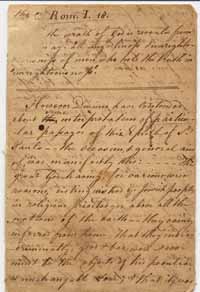
Rom. I. 18.
[For] the wrath of God is revealed from
["heave]n ag[ains]t all ungodliness & unrighte
"-ousness of men, who hold the truth in
"unrighteousness."
However Divines have contended
about the some interpretation of particu
-lar passages of this Epistle of St
Paul's — — the occasion & general aim
of it was manifestly this: — — — The
great God having, for various wise
reasons, distinguished ye
Jewish people,
in relgious priviledges above all the
nations of the earth — — they vainly
inferred from hence, that they indis
-criminently, good & bad, were — & ever
must be the objects of his peculiar
& unchangable Love; & that it was
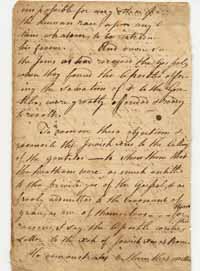 impossible for any other pa[faded]
impossible for any other pa[faded]
the human race, upon any [faded]
-tions whatsoever to be introduc[ed] [faded]
his favour. And even such [of]
the Jews as had received the Gospel,
when they found the Apostles offer-
-ing the Salvation of it to the Gen-
-tiles, were greatly offended & ready
to revolt.
To remove these objections &
reconcile the Jewish xns [Christians] to the Calling
of the gentiles — to show them that
the heathens were as much entitled
to the priviedges of the Gospel, & as
freely addmitted to the Covenant of
grace, as any of themselves — — — for these
reasons, I say, the Apostle writes this
Letter to the xch [church] of Jewish xns [Christians] at Rome.
He demonstrates to them, that neither
2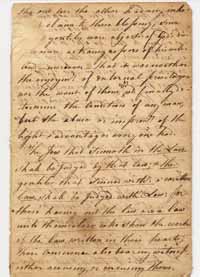 the one nor the other had any inhe
the one nor the other had any inhe
[rent] claim to those blessing; since
[faded] gentiles were objects of Gods' dis-
pleasure as transgressors of his will.
And—moreover—that it was neither
the enjoym[en]t
of external privilidges,
nor the want of them, yt[ that]
w[oul]d
finally de-
termine the condition of any man;
but the abuse or improvm[en]t
of the
[light] & advantages every one had.
The Jew that sinneth in the Law
shall be judged by that law; & the
gentiles that sinned with[ou]t
a written
law, shall be judged with[ou]t
law: for
those having not the law, are a law
unto themselves; who show the works
of the law written in their hearts;
their conscience also bearing witness,
either accusing, or excusing them.
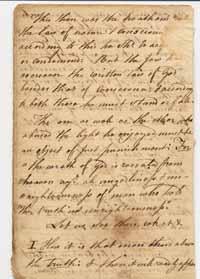
This then was the heathen's rule
the law of nature & conscience [faded]
according to this he sh[oul]d be acq[uitted]
or condemned: But the Jew has
moreover the written law of God
besides that of conscience; & according
to both these he must stand or fall.
The one as well as the other who
abused the light he enjoyed, must be
an object of just punishment: For
"the wrath of God is revealed from
"heaven ag[ains]t
all ungodliness & un-
"righteousness of men who hold
"the truth in unrighteousness."
Let us see then, what &
I How it is that men thus abuse
the truth
: & then it will readily ap[pear]
3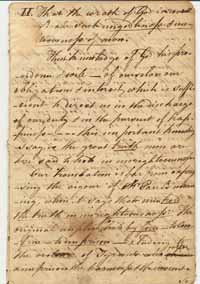
II That the wrath of God is reveal
[ed] ag[ains]t
all such ungodliness & im
[-pe]tuousness of men.
[The] knowledge of God his pro-
-vidence & will — of ourselves, our
obligations & interest, which is suffi-
-cient to direct us in the discharge
of our duty & in the pursuit of hap-
-piness — — — this important knowledge
— I say is the great truth
men are
here said to hold in unrighteousness.
Our translation is far from express-
ing the vigour of St. Paul's mean-
ing, when it says that men hold
the truth in unrighteousness: The
original implies hold by force — to con-
-fine — to imprison — aluding to
the violence of Tyrants who chain fetter
& imprison the harmless & the innocent.
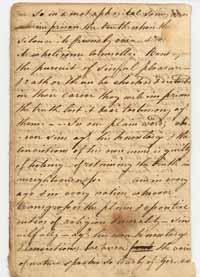 So in a metaphorical sence, men
So in a metaphorical sence, men
who imprison the truth when th[faded]
silence its friendly voice D[faded]
its wholesome counsells. Bent upon
the pursuit of sinful pleasure —
& rather than be shocked & disturbed
in their career they will imprison
the truth, lest it bear testimony ag[ains]t
them. — — In one plain word; who-
-ever sins ag[ains]t
his knowledge & the
convictions of his own mind is guilty
of holding — of retaining the truth in
unrighteousness. — And in every
age & in every nation whoever
transgresses the plain & essential
duties of religion & morality — sins
willfully — ag[ains]t his own knowledge
& convictions; because first the voice
of nature speaks so loudly of God, as
4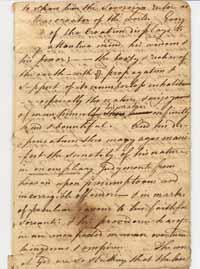 to show him the sovereign ruler as
to show him the sovereign ruler as
[well] as creator of the world. Every
[faded]t of the creation displays to
[every] attentive mind, his wisdom &
his power; — — the beauty & riches of
the earth — with ye
propogation &
support of its numberless inhabitants
— — — especially the nature & enjoyment
of man himself show him his makers infinity
kind & bountiful. And his dis-
-pensations thro many ages mani-
-fest [serenity] of his nature,
in exemplary judgements from
heaven upon presumptuous and
incorrigible offenders — & in [mark]
of peculiar favour to his faithful
servants: & his providence has often
in an unexpected manner overturn[ed]
kingdoms & empires. The wor[ks]
of God are so striking that the least
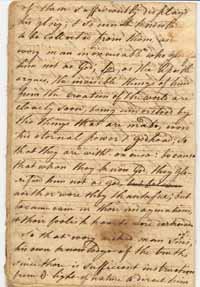 of them sufficiently displays
of them sufficiently displays
his glory; & so much knowledge
to be collected from them, as [faded]
every man inexcusable who glorifies
him not as God; for, as the Apostle
argues, the invisible things of him
from the creation of the world are
clearly seen, being understood by
the things that are made, [even]
his eternal power & Godhead; so
that they are with[ou]t
excuse: because
that when they knew God they glo-
-rified him not as God but became
neither were they thankful; but
became in their imaginations,
& their foolish hearts were darkened.
So that every wicked man sins ag[ains]t
his own knowledge of the truth,
since there is sufficient instruction
from ye
light of nature to direct him
5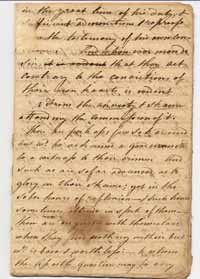 in the great lines of his duty, &
in the great lines of his duty, &
sufficient admonitions & reproofs
[faded] the testimony of his own con-
-science. And when ever men do
sin, it is evident that they act
contrary to the convictions of
their own hearts is evident.
I From the anxiety & shame
attending the commission of it.
There are perhaps a few so hardened
but w[oul]d
be ashamed a good man sh[oul]d
be a witness to their crimes. And
such as are so far advanced, as to
glory in their shame; yet in the
sober hours of reflexion — & such hours
sometimes obtrude in spite of them — —
then are disgusted with themselves,
when they find nothing within but
w[ha]t
is base & worthless: — to whom
the Apostle question may be very
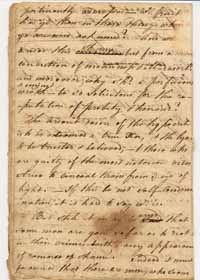 pertinently addressed — w[ha]t fruit
pertinently addressed — w[ha]t fruit
had ye
then in those things where
ye
are now ashamed? And wh[faded]
arises this conviction shame but from a m[illegible]
conviction of meanness & ill-d[eser]t?
And moreover; why sh[oul]d
a perfidious
and unjust wretch — be so solicitous for the re-
-putation of probity & honour?
The ardent desire of the hypocrite
is to be esteemed a true xn [Christian], & the lyar
to be trusted & believed; — & those who
are guilty of the most notorious vices
strive to conceal them from ye
eye of
light. — If this be not self-condem
-nation, it is hard to say w[ha]t
is.
But still it may be said read that
some men are gone so far as to riot
in their crimes — with[ou]t
any appearance
of remorse or shame. Indeed it must
be owned that there are men, who seem
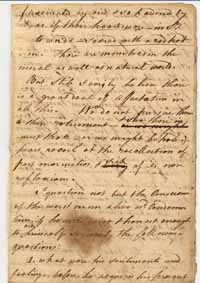 fascinated by vice & so hardened by
fascinated by vice & so hardened by
it as if their heart were — in St.
Paul's words — seared with a red hot
iron. There are monsters in the
moral as well as natural world.
But still I verily believe there
is a great deal of affectation in
all this. We do not pursue them
to their retirement — or we might & see them in
-most tho[ugh]ts
— or we might behold ye
heart recoil at the recollection of
past enormities, & wary sick of its own
reflexions.
I question not but the conscience
of the worst man alive w[oul]d
condemn
him, if he were wise & honest enough
to ask him self seriously the following
questions:
1. what were his sentiments and
feelings, before, he acquired his present
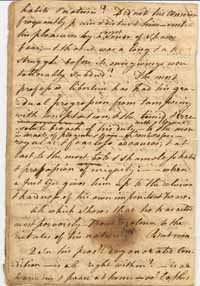 habits & notions? Did not his conscience
habits & notions? Did not his conscience
frequently pain & disturb him — embitter
his pleasures by a secret sense of shame [faded]
fear; — & that it was a long & a hard
struggle before its misgivings were
tollerably subdued? The most
professed libertine has had his gra
-dual progression from tampering
with temptation, & the timid & irre
-solute breach of his duty with alternate intervals of pleasure & pain — or revulsion & fear — to the more
regular & fearless advances; & at
last, to the most bold & shameless habit
& [profession] of iniquity: — — when
a just God gives him up to the delusion
& hardness of his own impenitent heart.
All which shows that he has acted
most perversly — & done violence to the
dictates of his nature. But even
2. In his pres[en]t
degenerated con
-dition — is all right within? — is all
harmony & peace at home — no lashes
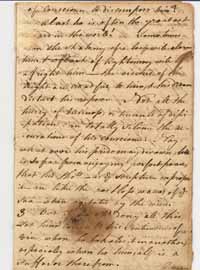 of conscience to discompose him?
of conscience to discompose him?
Alas! He is often the greatest
coward in the world! — Sometimes
even the shaking of a leaf will alarm
him, & a flash of lightening will [blot]
affright him — the visions of the
night are dreadful to him, & his dream[s]
disturb his repose. Not all the
hurry of business, or tumult of disi-
pation can totally silence the ac-
-cusations of his conscience. Nay,
what ever his pride may disown, he
is so far from enjoying perfect peace,
that his tho[ugh]ts
— as ye scripture expresses
it — are like the restless waves of ye
sea — when agitated by the wind.
3 But if he sh[oul]d
deny all this,
let him consult his sentiments of
vice, when he beholds it in another;
especially when he himself is a
sufferor therefrom.
A man
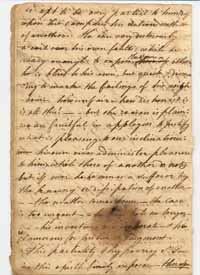 is apt to be very partial to himself
is apt to be very partial to himself
when he compares his actions with those
of another. He can vary dexterously [faded]
a veil over his own faults, while he is
ready enough to expose those of the same in another;
he is blind to his own, but quick & discern
-ing to mark the failings of his neigh-
-bour; — how unfair — how dishonest is
is all this! — — but the reason is plain:
we are fruitful in appologies to justify
what is pleasing to our inclinations:
— his own vices administer pleasure
to him, while those of another do not;
but if ever he becomes a sufferer by
the knavery or dissipation of another
— — the matter comes home — the case
is too urgent — — he can hold no longer —
— — — his invectives are desparate — & he
is clamorous for Justice & Judgement.
This partiality & hypocrisy St
Paul
in his epistle firmly exposes — therefore
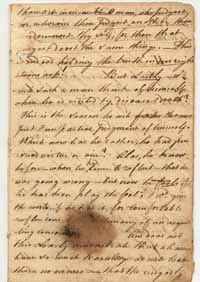 thou art inexcusable O man, who judgest,
thou art inexcusable O man, who judgest,
for wherein thou judgest another thou
condemnest thy self; for thou that
judgest doest the same things. — This
is indeed holding the truth in unright-
-teousness! — But Lastly w[ha]t
will such a man think of himself
when he is visited by disease & death?
This is the season he will f[illegible]n the most
just & impartial judgment of himself.
Which now had he rather, he had pur-
-sued virtue or vice? Alas, he knew
before — when he had time to reflect that he
was going wrong — but now he feels yt [that]
he has been play the fool; & w[oul]d
give
the world if he had it, for comfortable
reflexions, & the testimony of an acquit-
-ting conscience. And does not
this clearly demonstrate that all men
have so much knowledge as will leave
them no excuse — that the ungodly
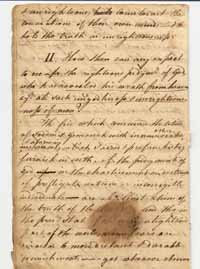 & unrighteous
& unrighteous hold counteract the
convictions of their own minds — & th[at]
hold the truth in unrighteousness.
II. How then can any expect
to escape the righteous judgem[en]ts
of God,
who has revealed his wrath from heaven
ag[ains]t
all such ungodliness & unrighteous-
-ness of men?
The fire which consumed the cities
of Sodom & Gomorrah with innumerable other
& alarming instances, which sacred & profane history
furnishes with, of the judgments of
God upon in the chastisement or destruc[tio]n
of profligate nations or incorrigible
individuals — are all illustrations of
the truth of the text. And tho in
the pres[en]t
state of the more enlightened
part of the world, mans fears are
directed to more distant & durable
punishments — — yet whoever observes
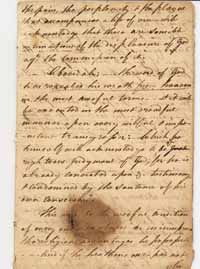 the pain, the perplexity, & the plague
the pain, the perplexity, & the plague
that accompanies a life of vice — will
acknowledge that these are sensible
intimations of the displeasure of God
ag[ains]t
the commission of it.
Above all; — — the word of God
has revealed his wrath from heaven
in the most awful terms — — — & it will
be executed in the most dreadful
manner upon every willful & impe-
-nitent transgressor: which he
himself will acknowledge to be ye
just
righteous judgment of God; for he is
already convicted upon ye
testimony,
& condemned by the sentence of his
own conscience.
This will be the woeful condition
of every one who abuses or [misimproves]
the religious advantages he proposes:
— — — And if the heathens, excaped not
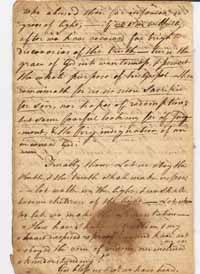 who abused their far inferior de-
who abused their far inferior de-
-grees of light; — if we sin willfully,
after we have received far brighter
discoveries of the truth — turn the
grace of God into wantonness, & pervert
the whole purpose of his Gospel — there
remaineth for us no more sacrifice
for sin, nor hopes of redemption;
but some fearful looking for judg-
-ment, — the firy indignation of an
in[cence]d God.
Finally then; Let us obey the
truth, & the truth shall make us free;
— — let walk in the light, & we shall
become children of the light — Let when
too late we make the Lamentation — —
"How have I hated instruction, & my
"heart despised reproof! — — And have not
"obeyed the voice of wisdom, nor inclined my ear
"to understanding!"
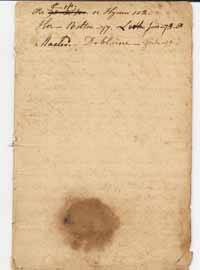
Ps. 90 [illegible] 9th - 1.p. or Hymn 102
Hon. — Bottom — [77] Le[illegible] Jan-[10]--81
Mac[illegible]d — [Doblame] — York 99